Can You Eat Durian After Nose Surgery? Reasons and Considerations After the Surgery
Beauty secrets
Dec 26, 2024
Dec 26, 2024
Durian is a type of fruit that is very much loved and has high nutritional content. However, for women after just having a nose job, whether they can eat durian is a question that many people are concerned about. Please refer to the answers from Aura Beauty Salon in the article below!
Durian is a type of fruit that is very much loved and has high nutritional content. However, for women after just having a nose job, whether they can eat durian is a question that many people are concerned about. Please refer to the answers from Aura Beauty Salon in the article below!
Durian is a type of fruit that is very much loved and has high nutritional content. However, for women after just having a nose job, whether they can eat durian is a question that many people are concerned about. Please refer to the answers from Aura Beauty Salon in the article below!
1. Can you eat durian after nose surgery?
Can you eat durian after nose surgery? The answer is NO. Some cosmetic facilities recommend avoiding durian due to concerns about allergic reactions, rashes, or internal heat. Especially in the early stages after surgery, when the body is still sensitive, eating too much durian can lead to some undesirable reactions. Therefore, you should avoid eating durian for 1 month after nose surgery. If you really enjoy eating durian, you can eat a small amount and observe your body's reaction. However, do not overindulge as durian is known to heat the body, which can affect the wound healing process.
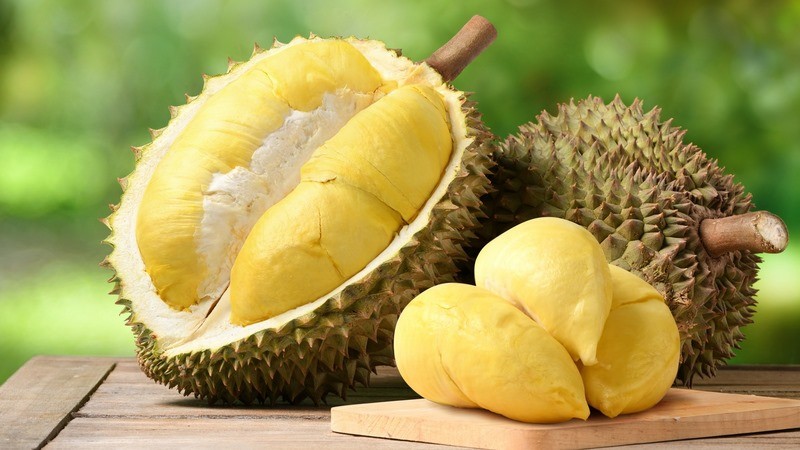
To ensure safety, it is best to consult your surgeon for specific dietary advice after nose surgery. The doctor will base their recommendations on your health status and body constitution to provide the most suitable advice.
2. The harm of durian after nose surgery
After knowing the answer to the question “can you eat durian after nose surgery?”, you can also refer to some of the harms of durian for patients after undergoing nose surgery as follows:
Impact on the healing process: Durian may reduce the healing ability of wounds due to its high sugar and saturated fat content.
Affecting blood circulation: Durian may increase blood flow, causing swelling or bruising in the nasal area.
Impact on the immune system: The components in durian can cause allergic reactions or infections, slowing down the healing process.
Negative impact on scars: Durian's heating properties affect recovery. Especially if too much durian is consumed and the patient has a sensitive constitution, it may affect scar formation after surgery.
Causes discomfort: Durian may cause uncomfortable symptoms such as internal heat, acne, constipation, especially in those with a sensitive constitution.
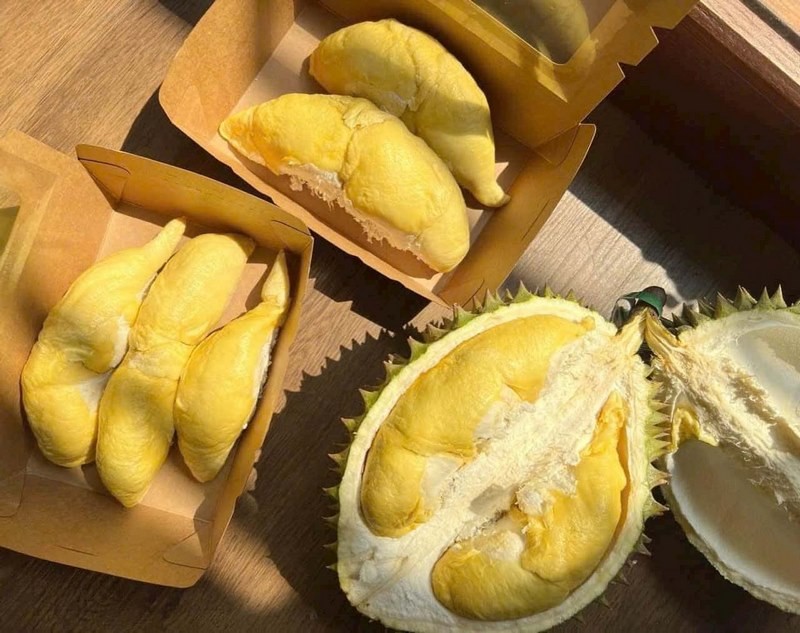
3. What to do if you have eaten durian after nose surgery?
If you accidentally consume durian after nose surgery, you should quickly take the following remedial measures:
Closely monitor the situation: Carefully observe the nasal area and other bodily symptoms such as swelling, redness, itching, pain.
Immediately notify your surgeon: If any abnormal signs occur, immediately contact your doctor for advice and examination. At the same time, you should drink enough water to eliminate toxins and support the healing process.
Supportive measures for quick recovery: You can take anti-inflammatory medication, maintain good hygiene for the nasal area, clean and avoid touching the nose to limit potential inflammatory issues.
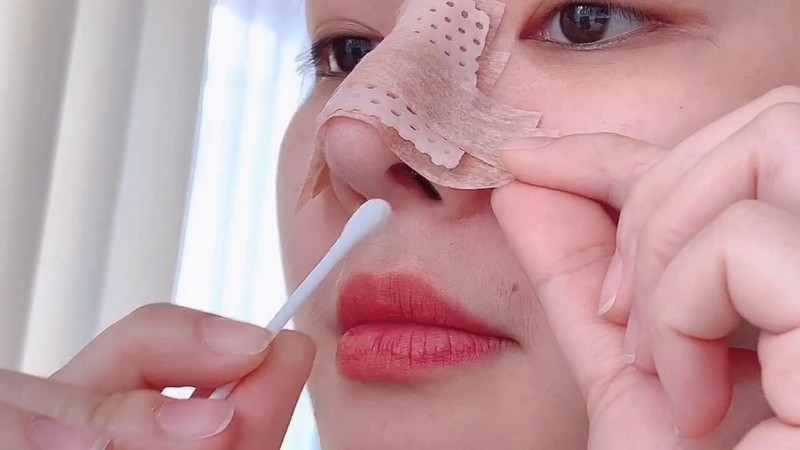
4. Other important advice after nose surgery
Besides the question “can you eat durian after nose surgery?”, many individuals are also curious about post-operative care related to this beauty procedure. You can refer to the following information to know how to care properly after nose surgery:
4.1. Reasonable diet
The diet after nose surgery plays a very important role in supporting the recovery process and ensuring the desired aesthetic outcomes. Below are the foods you should include:
Protein-rich foods: Help regenerate cells and heal wounds quickly. Good sources of protein include lean meats, fish, eggs, milk, soybeans, and nuts.
Vitamin C-rich foods: Boost the immune system, promote collagen production, and help wounds heal quickly. Good sources of vitamin C include oranges, tangerines, grapefruits, strawberries, kiwis, and leafy greens like broccoli, kale, and bell peppers.
Zinc-rich foods: Zinc helps strengthen the immune system, supports wound healing, and collagen production. Rich sources of zinc include seafood, beef, nuts, and lentils.
Fiber-rich foods: Help the digestive system function well, preventing constipation. Leafy greens, fruits, and whole grains are excellent sources of fiber.
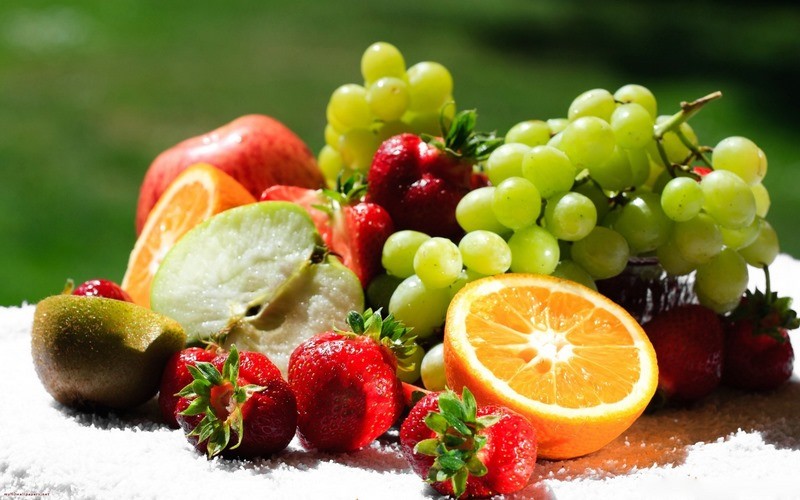
Along with that, you should limit and avoid some of the following foods:
Spicy hot foods: Can irritate the wound, increase sweating, and slow down the healing process.
Greasy foods: Difficult for digestion, causing bloating, affecting blood circulation.
Hard, chewy foods: Making it difficult to chew and swallow; may cause trauma to the nasal area.
Foods high in sugar: Can cause inflammation, slowing down the healing process.
Alcohol, beer, coffee, and stimulants: Affect blood circulation, slowing down the recovery process.
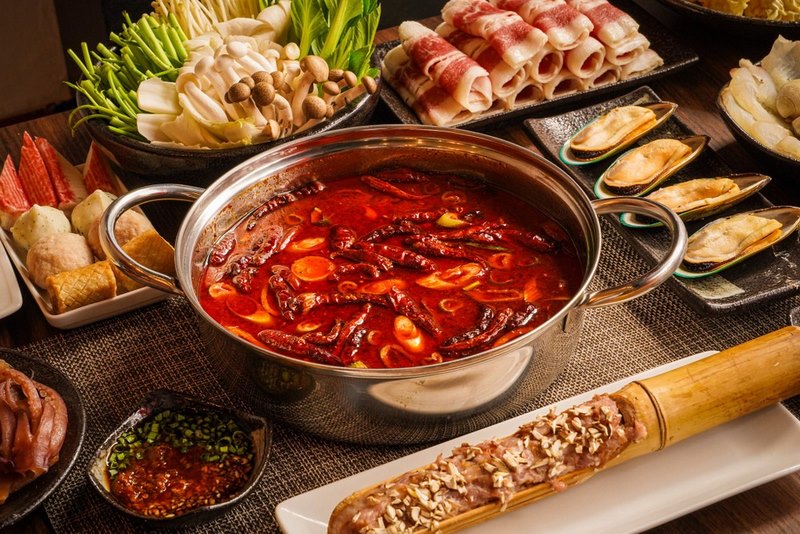
4.2. Care for the nose after surgery
Caring for the nose after surgery is very important to ensure the best aesthetic results and prevent complications. Below are the necessary steps for you to care for and protect your nose throughout the recovery process:
In the first few days, you should rest completely, limiting intense activities to reduce swelling and pain.
Use an ice pack wrapped in a cold cloth to apply to the nose in the first 24-48 hours to reduce swelling and pain.
Follow the prescribed dosage and duration for pain relief medication, antibiotics, and other medications as directed by your doctor.
Use saline solution to gently clean the nose, avoiding damage to the wound.
When sleeping, keep your head elevated with a pillow to reduce swelling.
Avoid touching the nose, and do not wear glasses during the initial period.
Use sunscreen when going outside to protect the skin around the nose.
Regularly visit the hospital for check-ups and monitor the recovery process.

With the above sharing, I hope you have found the answer to the question “can you eat durian after nose surgery?”. Besides durian, you should also pay attention to avoiding and caring for your body well to ensure your nose heals beautifully. Wishing you soon have a graceful, natural, and beautiful nose shape!
1. Can you eat durian after nose surgery?
Can you eat durian after nose surgery? The answer is NO. Some cosmetic facilities recommend avoiding durian due to concerns about allergic reactions, rashes, or internal heat. Especially in the early stages after surgery, when the body is still sensitive, eating too much durian can lead to some undesirable reactions. Therefore, you should avoid eating durian for 1 month after nose surgery. If you really enjoy eating durian, you can eat a small amount and observe your body's reaction. However, do not overindulge as durian is known to heat the body, which can affect the wound healing process.

To ensure safety, it is best to consult your surgeon for specific dietary advice after nose surgery. The doctor will base their recommendations on your health status and body constitution to provide the most suitable advice.
2. The harm of durian after nose surgery
After knowing the answer to the question “can you eat durian after nose surgery?”, you can also refer to some of the harms of durian for patients after undergoing nose surgery as follows:
Impact on the healing process: Durian may reduce the healing ability of wounds due to its high sugar and saturated fat content.
Affecting blood circulation: Durian may increase blood flow, causing swelling or bruising in the nasal area.
Impact on the immune system: The components in durian can cause allergic reactions or infections, slowing down the healing process.
Negative impact on scars: Durian's heating properties affect recovery. Especially if too much durian is consumed and the patient has a sensitive constitution, it may affect scar formation after surgery.
Causes discomfort: Durian may cause uncomfortable symptoms such as internal heat, acne, constipation, especially in those with a sensitive constitution.

3. What to do if you have eaten durian after nose surgery?
If you accidentally consume durian after nose surgery, you should quickly take the following remedial measures:
Closely monitor the situation: Carefully observe the nasal area and other bodily symptoms such as swelling, redness, itching, pain.
Immediately notify your surgeon: If any abnormal signs occur, immediately contact your doctor for advice and examination. At the same time, you should drink enough water to eliminate toxins and support the healing process.
Supportive measures for quick recovery: You can take anti-inflammatory medication, maintain good hygiene for the nasal area, clean and avoid touching the nose to limit potential inflammatory issues.

4. Other important advice after nose surgery
Besides the question “can you eat durian after nose surgery?”, many individuals are also curious about post-operative care related to this beauty procedure. You can refer to the following information to know how to care properly after nose surgery:
4.1. Reasonable diet
The diet after nose surgery plays a very important role in supporting the recovery process and ensuring the desired aesthetic outcomes. Below are the foods you should include:
Protein-rich foods: Help regenerate cells and heal wounds quickly. Good sources of protein include lean meats, fish, eggs, milk, soybeans, and nuts.
Vitamin C-rich foods: Boost the immune system, promote collagen production, and help wounds heal quickly. Good sources of vitamin C include oranges, tangerines, grapefruits, strawberries, kiwis, and leafy greens like broccoli, kale, and bell peppers.
Zinc-rich foods: Zinc helps strengthen the immune system, supports wound healing, and collagen production. Rich sources of zinc include seafood, beef, nuts, and lentils.
Fiber-rich foods: Help the digestive system function well, preventing constipation. Leafy greens, fruits, and whole grains are excellent sources of fiber.

Along with that, you should limit and avoid some of the following foods:
Spicy hot foods: Can irritate the wound, increase sweating, and slow down the healing process.
Greasy foods: Difficult for digestion, causing bloating, affecting blood circulation.
Hard, chewy foods: Making it difficult to chew and swallow; may cause trauma to the nasal area.
Foods high in sugar: Can cause inflammation, slowing down the healing process.
Alcohol, beer, coffee, and stimulants: Affect blood circulation, slowing down the recovery process.

4.2. Care for the nose after surgery
Caring for the nose after surgery is very important to ensure the best aesthetic results and prevent complications. Below are the necessary steps for you to care for and protect your nose throughout the recovery process:
In the first few days, you should rest completely, limiting intense activities to reduce swelling and pain.
Use an ice pack wrapped in a cold cloth to apply to the nose in the first 24-48 hours to reduce swelling and pain.
Follow the prescribed dosage and duration for pain relief medication, antibiotics, and other medications as directed by your doctor.
Use saline solution to gently clean the nose, avoiding damage to the wound.
When sleeping, keep your head elevated with a pillow to reduce swelling.
Avoid touching the nose, and do not wear glasses during the initial period.
Use sunscreen when going outside to protect the skin around the nose.
Regularly visit the hospital for check-ups and monitor the recovery process.

With the above sharing, I hope you have found the answer to the question “can you eat durian after nose surgery?”. Besides durian, you should also pay attention to avoiding and caring for your body well to ensure your nose heals beautifully. Wishing you soon have a graceful, natural, and beautiful nose shape!
1. Can you eat durian after nose surgery?
Can you eat durian after nose surgery? The answer is NO. Some cosmetic facilities recommend avoiding durian due to concerns about allergic reactions, rashes, or internal heat. Especially in the early stages after surgery, when the body is still sensitive, eating too much durian can lead to some undesirable reactions. Therefore, you should avoid eating durian for 1 month after nose surgery. If you really enjoy eating durian, you can eat a small amount and observe your body's reaction. However, do not overindulge as durian is known to heat the body, which can affect the wound healing process.

To ensure safety, it is best to consult your surgeon for specific dietary advice after nose surgery. The doctor will base their recommendations on your health status and body constitution to provide the most suitable advice.
2. The harm of durian after nose surgery
After knowing the answer to the question “can you eat durian after nose surgery?”, you can also refer to some of the harms of durian for patients after undergoing nose surgery as follows:
Impact on the healing process: Durian may reduce the healing ability of wounds due to its high sugar and saturated fat content.
Affecting blood circulation: Durian may increase blood flow, causing swelling or bruising in the nasal area.
Impact on the immune system: The components in durian can cause allergic reactions or infections, slowing down the healing process.
Negative impact on scars: Durian's heating properties affect recovery. Especially if too much durian is consumed and the patient has a sensitive constitution, it may affect scar formation after surgery.
Causes discomfort: Durian may cause uncomfortable symptoms such as internal heat, acne, constipation, especially in those with a sensitive constitution.

3. What to do if you have eaten durian after nose surgery?
If you accidentally consume durian after nose surgery, you should quickly take the following remedial measures:
Closely monitor the situation: Carefully observe the nasal area and other bodily symptoms such as swelling, redness, itching, pain.
Immediately notify your surgeon: If any abnormal signs occur, immediately contact your doctor for advice and examination. At the same time, you should drink enough water to eliminate toxins and support the healing process.
Supportive measures for quick recovery: You can take anti-inflammatory medication, maintain good hygiene for the nasal area, clean and avoid touching the nose to limit potential inflammatory issues.

4. Other important advice after nose surgery
Besides the question “can you eat durian after nose surgery?”, many individuals are also curious about post-operative care related to this beauty procedure. You can refer to the following information to know how to care properly after nose surgery:
4.1. Reasonable diet
The diet after nose surgery plays a very important role in supporting the recovery process and ensuring the desired aesthetic outcomes. Below are the foods you should include:
Protein-rich foods: Help regenerate cells and heal wounds quickly. Good sources of protein include lean meats, fish, eggs, milk, soybeans, and nuts.
Vitamin C-rich foods: Boost the immune system, promote collagen production, and help wounds heal quickly. Good sources of vitamin C include oranges, tangerines, grapefruits, strawberries, kiwis, and leafy greens like broccoli, kale, and bell peppers.
Zinc-rich foods: Zinc helps strengthen the immune system, supports wound healing, and collagen production. Rich sources of zinc include seafood, beef, nuts, and lentils.
Fiber-rich foods: Help the digestive system function well, preventing constipation. Leafy greens, fruits, and whole grains are excellent sources of fiber.

Along with that, you should limit and avoid some of the following foods:
Spicy hot foods: Can irritate the wound, increase sweating, and slow down the healing process.
Greasy foods: Difficult for digestion, causing bloating, affecting blood circulation.
Hard, chewy foods: Making it difficult to chew and swallow; may cause trauma to the nasal area.
Foods high in sugar: Can cause inflammation, slowing down the healing process.
Alcohol, beer, coffee, and stimulants: Affect blood circulation, slowing down the recovery process.

4.2. Care for the nose after surgery
Caring for the nose after surgery is very important to ensure the best aesthetic results and prevent complications. Below are the necessary steps for you to care for and protect your nose throughout the recovery process:
In the first few days, you should rest completely, limiting intense activities to reduce swelling and pain.
Use an ice pack wrapped in a cold cloth to apply to the nose in the first 24-48 hours to reduce swelling and pain.
Follow the prescribed dosage and duration for pain relief medication, antibiotics, and other medications as directed by your doctor.
Use saline solution to gently clean the nose, avoiding damage to the wound.
When sleeping, keep your head elevated with a pillow to reduce swelling.
Avoid touching the nose, and do not wear glasses during the initial period.
Use sunscreen when going outside to protect the skin around the nose.
Regularly visit the hospital for check-ups and monitor the recovery process.

With the above sharing, I hope you have found the answer to the question “can you eat durian after nose surgery?”. Besides durian, you should also pay attention to avoiding and caring for your body well to ensure your nose heals beautifully. Wishing you soon have a graceful, natural, and beautiful nose shape!
REGISTER NOW
REGISTER NOW
REGISTER NOW



Author
Dr. Huynh Cong Thanh
Dr. Huỳnh Công Thành has over 12 years of experience in the field of aesthetics and skin treatment for more than 100,000 clients.
See more
See more
You may be interested

Beauty secrets
Is it possible to drink soybean milk after nose lifting? How long until I can drink it?

Beauty secrets
Is it possible to drink soybean milk after nose lifting? How long until I can drink it?

Beauty secrets
Is it possible to drink soybean milk after nose lifting? How long until I can drink it?

Beauty secrets
Can I eat instant noodles after nose lifting? Will it have any effect?

Beauty secrets
Can I eat instant noodles after nose lifting? Will it have any effect?

Beauty secrets
Can I eat instant noodles after nose lifting? Will it have any effect?

Beauty secrets
Can I eat chicken after nose job? How long should I avoid eating chicken?

Beauty secrets
Can I eat chicken after nose job? How long should I avoid eating chicken?

Beauty secrets
Can I eat chicken after nose job? How long should I avoid eating chicken?

Beauty secrets
Can I eat corn after a nose job? How long should I avoid eating corn?

Beauty secrets
Can I eat corn after a nose job? How long should I avoid eating corn?

Beauty secrets
Can I eat corn after a nose job? How long should I avoid eating corn?

Beauty secrets
Can I eat eggs after nose surgery? How long until I can eat eggs?

Beauty secrets
Can I eat eggs after nose surgery? How long until I can eat eggs?

Beauty secrets
Can I eat eggs after nose surgery? How long until I can eat eggs?


